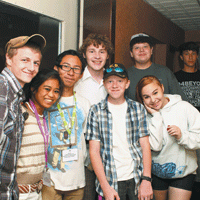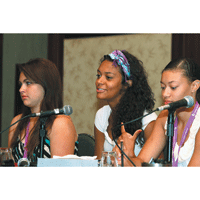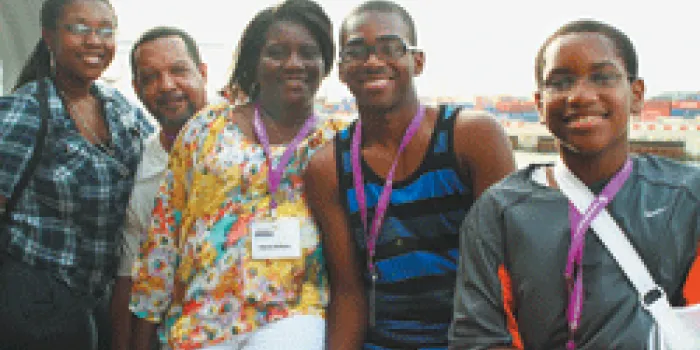For people with hemophilia with inhibitors, managing their bleeding disorders can have unique challenges. Their immune system treats clotting factor as an enemy and produces antibodies, called inhibitors, to battle it. As a result, the effectiveness of the factor is reduced or eliminated, depending on the severity of the reaction. People with hemophilia with inhibitors tend to miss more work and school, and experience more joint damage, arthritis and other complications than those without inhibitors. Although inhibitors are rare—approximately 25% of people with hemophilia A and 1% to 4% of people with hemophilia B are affected—there is a greater focus on them than in the past.
The National Hemophilia Foundation (NHF) held four Inhibitor Education Summits in 2012, two of which were for Spanish-speaking families. The sessions conducted in Spanish were held in Los Angeles May 11 to 13 and in Miami June 22 to 24. Approximately 25 families attended the two summits, which featured sessions on immune tolerance therapy, parenting issues and new treatments.

Participants from the Teen Track
hanging out on the San Diego
final night cruise.
The summits for English-speaking families were held in Miami July 19 to 22 and in San Diego August 2 to 5. They were divided into four tracks: Hemophilia with Inhibitors 101 for families with newly diagnosed children; Hemophilia 201 for more experienced families; Young Men with Inhibitors for teens 13-18 years old; and Men with Hemophilia with Inhibitors for those 18 and older. The sessions provided a mix of practical education on topics ranging from the importance of treating bleeds early to prevent joint disease to how to work with your child’s school to set up necessary accommodations. Doctors, nurses, physical therapists and social workers from hemophilia treatment centers across the US led the sessions.
Each track is planned for its intended audience, says Christa Dardaganian, director of educational strategy at NHF. “The session on sports and exercise for teens is different than the session on sports and exercise for adult men because some teens with inhibitors have the added pressure of wanting to join school team sports.” The teen track also had a session on when and how to disclose a bleeding disorder to friends and classmates.
All tracks included a session on pain management, a vital topic for people with inhibitors because of the frequency and long-term impact of their bleeds. These sessions focused on different types of pain medication, alternative pain management techniques and concerns about developing addiction to opioid pain medications.

Taylor Smith, Dominique Millette
and Alicia Gulledge (left to right)
share their perspectives during
the Miami siblings panel discussion.
Each of the English-speaking summits featured a plenary session with an interactive quiz on the history of hemophilia, hosted by Guy Young, MD, director of the Hemostasis and Thrombosis Center at Children’s Hospital Los Angeles. The summits also included two panel discussions: one for unaffected siblings to share their stories and another about meeting the challenges of dealing with inhibitors.
“People with hemophilia with inhibitors and their families have unique educational needs,” says Dardaganian. “Each year we hold the summits, we try to find new ways to meet those needs.”
Darryl Barron of Decatur, Georgia, whose son Derryl has an inhibitor, says that the summits are helping meet their needs. “These summits are an asset to the families and patients. They’re an educational blessing.”
The Inhibitor Education Summits are supported by an educational grant from Novo Nordisk. For information on the Inhibitor Education Summits, go to: www.nhfinhibitorsummits.org.

